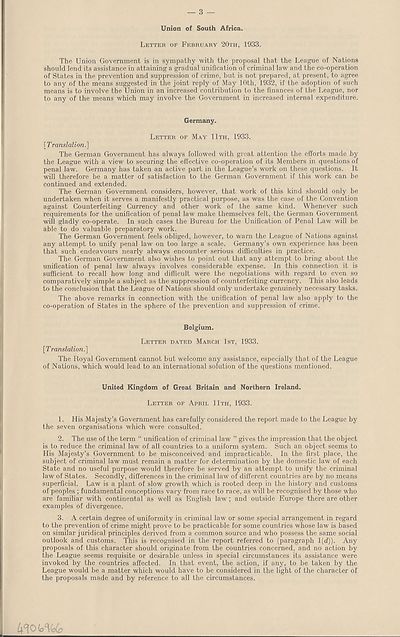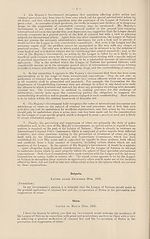Legal > Gradual unification of criminal law and co-operation of states in the prevention and suppression of crime
(3)
Download files
Complete book:
Individual page:
Thumbnail gallery: Grid view | List view

— 3
Union of South Africa.
Letter of February 20th, 1933.
The Union Government is in sympathy with the proposal that the League of Nations
should lend its assistance in attaining a gradual unification of criminal law and the co-operation
of States in the prevention and suppression of crime, but is not prepared, at present, to agree
to any of the means suggested in the joint reply of May 10th, 1932, if the adoption of such
means is to involve the Union in an increased contribution to the finances of the League, nor
to any of the means which may involve the Government in increased internal expenditure.
Germany.
Letter of May 11th, 1933.
[Translation.]
The German Government has always followed with great attention the efforts made by
the League with a view to securing the effective co-operation of its Members in questions of
penal law. Germany has taken an active part in the League’s work on these questions. It
will therefore be a matter of satisfaction to the German Government if this work can be
continued and extended.
The German Government considers, however, that work of this kind should only be
undertaken when it serves a manifestly practical purpose, as was the case of the Convention
against Counterfeiting Currency and other work of the same kind. Whenever such
requirements for the unification of penal law make themselves felt, the German Government
will gladly co-operate. In such cases the Bureau for the Unification of Penal Law will be
able to do valuable preparatory work.
The German Government feels obliged, however, to warn the League of Nations against
any attempt to unify penal law on too large a scale. Germany’s own experience has been
that such endeavours nearly always encounter serious difficulties in practice.
The German Government also wishes to point out that any attempt to bring about the
unification of penal law always involves considerable expense. In this connection it is
sufficient to recall how long and difficult were the negotiations with regard to even so
comparatively simple a subject as the suppression of counterfeiting currency. This also leads
to the conclusion that the League of Nations should only undertake genuinely necessary tasks.
The above remarks in connection with the unification of penal law also apply to the
co-operation of States in the sphere of the prevention and suppression of crime.
Belgium.
Letter dated March 1st, 1933.
[Translation.]
The Royal Government cannot but welcome any assistance, especially that of the League
of Nations, which would lead to an international solution of the questions mentioned.
United Kingdom of Great Britain and Northern Ireland.
Letter of April 11th, 1933.
1. His Majesty’s Government has carefully considered the report made to the League by
the seven organisations which were consulted.
2. The use of the term “ unification of criminal law ” gives the impression that the object
is to reduce the criminal law of all countries to a uniform system. Such an object seems to
His Majesty’s Government to be misconceived and impracticable. In the first place, the
subject of criminal law must remain a matter for determination by the domestic law of each
State and no useful purpose would therefore be served by an attempt to unify the criminal
law of States. Secondly, differences in the criminal law of different countries are by no means
superficial. Law is a plant of slow growth which is rooted deep in the history and customs
of peoples ; fundamental conceptions vary from race to race, as will be recognised by those who
are familiar with continental as well as English law ; and outside Europe there are other
examples of divergence.
3. A certain degree of uniformity in criminal law or some special arrangement in regard
to the prevention of crime might prove to be practicable for some countries whose law is based
on similar juridical principles derived from a common source and who possess the same social
outlook and customs. This is recognised in the report referred to (paragraph 1(d)). Any
proposals of this character should originate from the countries concerned, and no action by
the League seems requisite or desirable unless in special circumstances its assistance were
invoked by the countries affected. In that event, the action, if any, to be taken by the
League would be a matter which would have to be considered in the light of the character of
the proposals made and by reference to all the circumstances.
Union of South Africa.
Letter of February 20th, 1933.
The Union Government is in sympathy with the proposal that the League of Nations
should lend its assistance in attaining a gradual unification of criminal law and the co-operation
of States in the prevention and suppression of crime, but is not prepared, at present, to agree
to any of the means suggested in the joint reply of May 10th, 1932, if the adoption of such
means is to involve the Union in an increased contribution to the finances of the League, nor
to any of the means which may involve the Government in increased internal expenditure.
Germany.
Letter of May 11th, 1933.
[Translation.]
The German Government has always followed with great attention the efforts made by
the League with a view to securing the effective co-operation of its Members in questions of
penal law. Germany has taken an active part in the League’s work on these questions. It
will therefore be a matter of satisfaction to the German Government if this work can be
continued and extended.
The German Government considers, however, that work of this kind should only be
undertaken when it serves a manifestly practical purpose, as was the case of the Convention
against Counterfeiting Currency and other work of the same kind. Whenever such
requirements for the unification of penal law make themselves felt, the German Government
will gladly co-operate. In such cases the Bureau for the Unification of Penal Law will be
able to do valuable preparatory work.
The German Government feels obliged, however, to warn the League of Nations against
any attempt to unify penal law on too large a scale. Germany’s own experience has been
that such endeavours nearly always encounter serious difficulties in practice.
The German Government also wishes to point out that any attempt to bring about the
unification of penal law always involves considerable expense. In this connection it is
sufficient to recall how long and difficult were the negotiations with regard to even so
comparatively simple a subject as the suppression of counterfeiting currency. This also leads
to the conclusion that the League of Nations should only undertake genuinely necessary tasks.
The above remarks in connection with the unification of penal law also apply to the
co-operation of States in the sphere of the prevention and suppression of crime.
Belgium.
Letter dated March 1st, 1933.
[Translation.]
The Royal Government cannot but welcome any assistance, especially that of the League
of Nations, which would lead to an international solution of the questions mentioned.
United Kingdom of Great Britain and Northern Ireland.
Letter of April 11th, 1933.
1. His Majesty’s Government has carefully considered the report made to the League by
the seven organisations which were consulted.
2. The use of the term “ unification of criminal law ” gives the impression that the object
is to reduce the criminal law of all countries to a uniform system. Such an object seems to
His Majesty’s Government to be misconceived and impracticable. In the first place, the
subject of criminal law must remain a matter for determination by the domestic law of each
State and no useful purpose would therefore be served by an attempt to unify the criminal
law of States. Secondly, differences in the criminal law of different countries are by no means
superficial. Law is a plant of slow growth which is rooted deep in the history and customs
of peoples ; fundamental conceptions vary from race to race, as will be recognised by those who
are familiar with continental as well as English law ; and outside Europe there are other
examples of divergence.
3. A certain degree of uniformity in criminal law or some special arrangement in regard
to the prevention of crime might prove to be practicable for some countries whose law is based
on similar juridical principles derived from a common source and who possess the same social
outlook and customs. This is recognised in the report referred to (paragraph 1(d)). Any
proposals of this character should originate from the countries concerned, and no action by
the League seems requisite or desirable unless in special circumstances its assistance were
invoked by the countries affected. In that event, the action, if any, to be taken by the
League would be a matter which would have to be considered in the light of the character of
the proposals made and by reference to all the circumstances.
Set display mode to:
![]() Universal Viewer |
Universal Viewer | ![]() Mirador |
Large image | Transcription
Mirador |
Large image | Transcription
Images and transcriptions on this page, including medium image downloads, may be used under the Creative Commons Attribution 4.0 International Licence unless otherwise stated. ![]()
| League of Nations > Legal > Gradual unification of criminal law and co-operation of states in the prevention and suppression of crime > (3) |
|---|
| Permanent URL | https://digital.nls.uk/191516105 |
|---|
| Shelfmark | LN.V |
|---|
| Description | Over 1,200 documents from the non-political organs of the League of Nations that dealt with health, disarmament, economic and financial matters for the duration of the League (1919-1945). Also online are statistical bulletins, essential facts, and an overview of the League by the first Secretary General, Sir Eric Drummond. These items are part of the Official Publications collection at the National Library of Scotland. |
|---|---|
| Additional NLS resources: |
|

